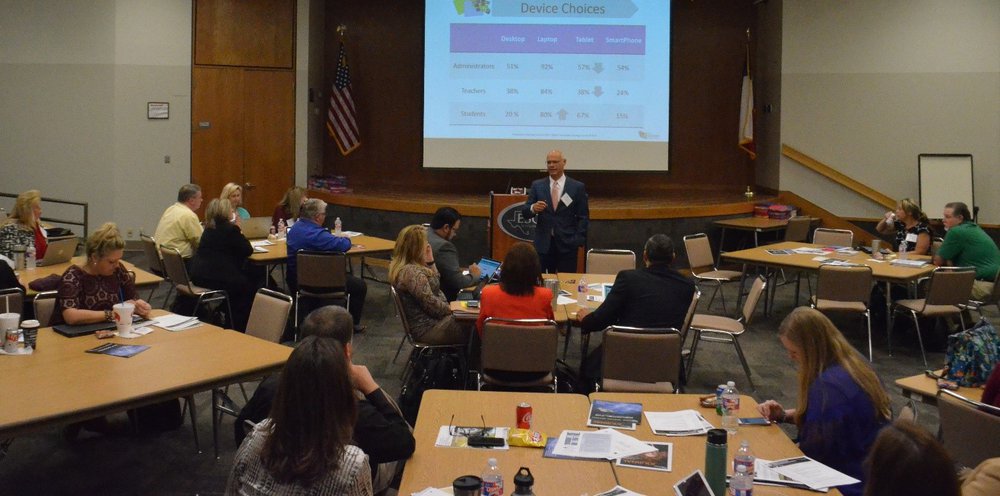Region 20, Education Service Center was the destination for San Antonio’s annual Learning Counsel Digital Curriculum Sustainability Discussion in early January 2017. Education executives travelled from across Texas, including some from as far away as El Paso, 550 miles to the west to take part in the day’s talks, exercises and leadership panel.
“The K12 education market is in the ‘eye of the storm’ of getting truly sophisticated in the adoption and use of digital curriculum,” stated LeiLani Cauthen, CEO and Publisher of the Learning Counsel during her morning keynote. “The education market is amid all types of confusion as to how to choose digital resources or how to build them for free and how to transform instruction in the classroom. And beyond that, where I’m really seeing frustration and change-anxiety is with Leaderhip having to modify their processes to consider managing via and with the technology.”
LeiLani went on to share insights in the EdTech market and what further shifts to expect in 2017 based on findings from the Learning Counsel Digital Curriculum Strategy Survey findings:
- 86% of schools expect purchase of digital curriculum to go up. Billions in spend has yet to shift out of paper textbooks into digital – 80% of those budgets still haven’t shifted. Schools and districts cite that they intend to move to full digital curriculum coverage models.
- 79%+ of schools have wireless network coverage for classrooms and common areas, but most are considered “unreliable” by teachers.
- A lot of work needs to be done regarding student data privacy and security – only 33% of schools have a policy regarding who has ownership of student data when shared with third party users, plus other issues.
Photo Gallery: San Antonio Discussion
The discussions through the day brought up the tough issues, transition barriers and many great solutions. Karla Burkholder, the Director of Instructional Technology for Schertz Cibolo Universal City ISD, addressed the audience. With a classic opening line, mic-drop moment, she stated, “Student-single-sign-on, enough said.” The room went silent and then broke into loud laughs of agreement. She further spoke to the point brought up during LeiLani’s keynote, on tech and software management being a new era challenge to get control of. “We had a large software purchase, with a well known digital courseware product for english language learners that I won’t name—it was their accelerated reader tool—and at the end of the year it was virtually impossible to find a success with its use,” she stated. “Its hard to believe but we just couldn’t find a positive report. How can we justify not only the purchase, but how to renew? And what’s our next option because we do need an ELL (English Language Learners) solution?”
The Learning Counsel is seeing this type of “review” in cities across the U.S. from leadership – vendors either selling and running and not taken responsbility for intructor training, or vendors failing to be proactive and work with a school or district to find a cheerleader, an “early adopter” to train. This is the difference between failing or winning that the Learning Counsel is hearing about coast to coast. A virtually identical but successful implementation story came up at the San Diego Digital Curriculum Discussion event with Classlink where a district purchased it but was not using it, not seeing its value, until a teacher was trained in its use and then suddenly was sharing successes all over the district as their best spokesperson.
Budgeting for tech sustainability was another top of mind subject during the day with leaders sharing how they’ve each confronted purchase of hardware and software and balanced that with service infrastructure vitals such as HVAC so devices and servers don’t melt in the San Antonio heat, and newer student security concerns such as surveillance cameras.
Dave Irek from sponsor company, Netsync Network Solutions, contributed solutions they've developed on network budgeting that will help save funds, while supporting the truly key bandwidth is sues. “We’ve put together what we call a ‘bandwidth projection tool’ which allows us to help schools figure out what they need and, also, how to pay for it," he stated. "There is a lot of over-spend that’s not necessary for some schools and other stuff for networks you absolutely must have for good bandwidth. There are many costs we’ve reworked to help schools remove from budget plans and apply the funds to things to be more long-term sustainable.”
sues. “We’ve put together what we call a ‘bandwidth projection tool’ which allows us to help schools figure out what they need and, also, how to pay for it," he stated. "There is a lot of over-spend that’s not necessary for some schools and other stuff for networks you absolutely must have for good bandwidth. There are many costs we’ve reworked to help schools remove from budget plans and apply the funds to things to be more long-term sustainable.”
Coordinator for Digital Age Learning for Education Service Center, Region 20, Susanna Clavello-Garza, and “card-carrying Librarian” Martha “Marty” Rossi the Project Manager for Digital Resources and Library Services then spoke to the group about digital and web literacy and a massive missing element they’ve found in the district’s instruction. “We did a study and pulled together data from all over the district and found that something on the order of 70% of students don’t know how to use the internet.” What they found for the most part is that teachers (72%) are afraid to let their students loose on the net to do research. On top of that, and here she quoted Alan November on a study he referenced from Dallas ISD, “The number one thing local businesses want to see students graduate with was Information Literacy.” “School’s must ensure students are better navigators in the digital world, Susanna stated. “And they have to be able to think critically and differentiate between real and fake information and what is an authoritative source.”
The day ended with a leadership panel which included: Bill Lewis, Assistant Superintendent of Tech and Curriculum Support, Seguin ISD; Karla Burkholder, the Director of Instructional Technology for Schertz Cibolo Universal City ISD; and, Susanna Clavello-Garza, Coordinator, Digital Age Learning, Education Service Center, Region 20.
San Antonio schools are clearly on the right path, searching for best routes to full transition to digital curriculum and technology and asking the important questions. We look forward to seeing everyone again next year and hearing about your successes and outcomes as we make our way in this time of change.










